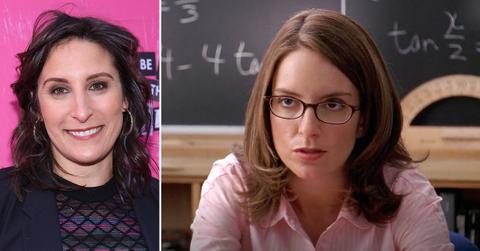 NEWS
NEWSAuthor Who Partly Inspired 'Mean Girls' Slams Tina Fey, Claims 'Queen Bee' Ghosted Her When She Sought Financial Compensation From The Franchise

April 15 2021, Updated 2:36 p.m. ET
While Tina Fey plays the teacher in Mean Girls, it turns out she may be a part of The Plastics behind closed doors.
Rosalind Wiseman — the author of the 2002 New York Times bestseller Queen Bees and Wannabes, which provided inspiration for the 2004 Mean Girls screenplay — revealed she was disappointed with Fey after allegedly asking the screenwriter and actor to use her power in the industry to help her get what she said she was financially owed.
While appearing on Aarti Shahani's "Art of Power" podcast, the author — who only received one payment of $440,000 upon signing the initial deal with Paramount Pictures, which apparently promised more money to come — claimed that after Fey agreed to help her, she was ghosted by the comedian.
According to Wiseman, in her contract with Paramount, she was promised 5 percent of net proceeds for her creative work for Mean Girls the movie. Between the popular film and the subsequent Broadway musical adaptation, Mean Girls has reportedly grossed over $250 million. From the movie alone, the franchise garnered $130 million at the box office; to date, the Broadway show has taken in a little bit over $124 million.
However, according to Wiseman, she was told by Paramount that the film was "not profitable."
"The movie has made a tremendous amount of money and I have received nothing," Wiseman told the podcast host. "Not a dime since my initial advance …this is the way Hollywood and entertainment goes, which is like sort of squirrels gathering as much nuts as possible in your mouth and not wanting to share anything."
In 2016, Wiseman learned, through reports, that Fey and her composer husband, Jeff Richmond, planned to bring Mean Girls to Broadway. But according to Wiseman's 2002 contract, she was not part of the rights to the live production because she only signed on for the movie deal; therefore, she would receive no compensation for the success of the Broadway show.
"There is no way for me to know that a musical was in the future. There's no way to know that. So I was signing away rights I didn't know that I had or was even up for....” she said looking back at her 2002 deal with Paramount.
Want OK! each day? Sign up here!
According to the recent podcast, Fey relied on Wiseman's expertise with the Mean Girls musical adaptation, having her review drafts, help with character development and train the young cast members on teamwork and anti-bullying education. In the end, the SNL star did not compensate Wiseman for her help or travel expenses, Wiseman claimed.
Two years later, Wiseman said she asked Fey to vouch for her rights with Paramount. And after Fey allegedly promised to assist Wiseman — going so far as to say she would speak to Lorne Michaels, the producer of Mean Girls and creator of Saturday Night Live, the author claimed — Fey apparently disappeared.
Wiseman admitted that she was incredibly hurt and shocked, especially after she said she asked for help from one female creator to another.
“You certainly don't want to admit it out loud because you don't want the world to look at this and then create some meme about like mean women and mean girls and, you know, and dismissing and superficializing the work because there is this inconsistency in real life," Wiseman said.
While drawing a connection between Wiseman's Queen Bees and Wannabes and Fey, Wiseman said the Baby Mama actress is more like the Queen Bee.
Shahani asked Wiseman what she learned from working with someone who is considered to be a Queen Bee, to which she responded: "I think that that's where a lot of people in this situation, I would say, were very Machiavellian, that the ends justify the means."
Wiseman also reflected on why she waited so long to speak on her experience. "Why was I so silent when I was literally telling boys and girls all of this time to speak out when there's been... when they've experienced an abuse of power?... Because just like everybody else, I got into the situation where I was intimidated and felt overwhelmed and that silenced me."


